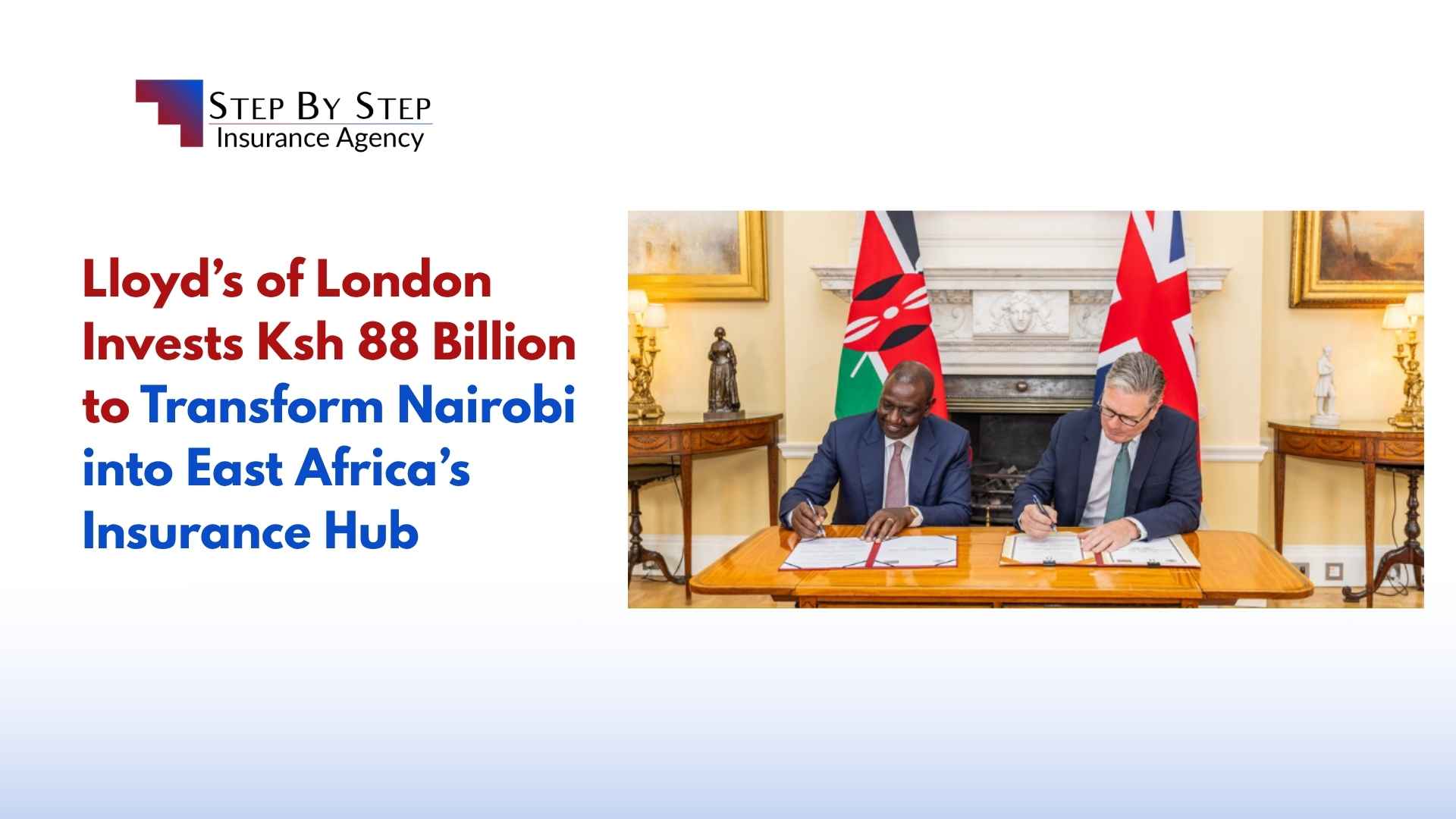Lloyd’s of London Invests Ksh 88 Billion to Transform Nairobi into East Africa’s Insurance Hub
When you think of the world’s insurance giants, Lloyd’s of London is a name that immediately commands respect. With centuries of history and a reputation for underwriting some of the world’s most complex risks, Lloyd’s is more than just an insurance marketplace—it’s a global institution. Now, in a move that’s sending ripples across the financial and business sectors, Lloyd’s of London is making its entry into the Nairobi insurance market. This strategic decision isn’t just about expanding business; it’s about positioning Nairobi as the beating heart of insurance innovation for East Africa. As part of the UK-Kenya Strategic Partnership (2025-2030), this development marks a watershed moment for the region’s insurance landscape.
Key Takeaways
- Historic Entry: Lloyd’s of London is establishing a presence in Nairobi as part of the UK-Kenya Strategic Partnership
- Massive Investment: Ksh 88 billion (approx. USD 600 million) commitment to the Kenyan market
- Regional Hub: Nairobi to become East Africa’s center for insurance innovation
- Enhanced Capacity: Introduction of specialized coverage for complex risks
- Economic Boost: Expected to significantly increase insurance penetration in Kenya
- Job Creation: Investment in talent development and infrastructure
Table of Contents
- Background: Lloyd’s of London and the Kenyan Insurance Market
- Strategic Objectives: More Than Just Market Entry
- Investment Details: The Ksh 88 Billion Commitment
- Anticipated Benefits for Kenya and East Africa
- Regulatory and Partnership Framework
- Market Impact and Challenges
- Future Outlook
- Conclusion
- Related Resources
Join Our Insurance Community
Stay updated with the latest insurance trends, news, and opportunities in Kenya and East Africa. Join our WhatsApp group to connect with professionals and enthusiasts!
Join NowBackground: Lloyd’s of London and the Kenyan Insurance Market
Lloyd’s of London isn’t your average insurance company. Founded in 1688, Lloyd’s has evolved from a humble coffee house where merchants met to discuss marine insurance into a global marketplace where syndicates underwrite everything from satellites to sporting events. Its model—bringing together capital, expertise, and innovation—has been exported to over 200 territories worldwide.
But why Nairobi, and why now? Kenya’s insurance sector has been on a steady upward trajectory, outpacing many of its African peers. The country boasts a burgeoning middle class, increasing urbanization, and a government keen on regulatory reforms and financial inclusion. Nairobi, with its robust financial infrastructure and strategic location, acts as a gateway to the broader East African Community (EAC), a region with over 300 million people and rapidly growing economies. The city’s emergence as a technology hub—often dubbed “Silicon Savannah”—has further enhanced its appeal as a regional financial center.
Lloyd’s entry is not just another foreign investment; it’s a strategic bet on the future of African insurance. As local and international businesses in East Africa become more sophisticated, their risk profiles are evolving. There’s a growing demand for complex insurance products—think infrastructure, energy, aviation, and cyber risks—that require specialized expertise and significant underwriting capacity. Lloyd’s, with its centuries of experience and global network, is uniquely positioned to fill this gap.
Strategic Objectives: More Than Just Market Entry
The decision by Lloyd’s to establish a presence in Nairobi is underpinned by several strategic objectives:
Strengthening UK-Kenya Economic Ties
The move is a cornerstone of the UK-Kenya Strategic Partnership, designed to deepen economic, financial, and cultural links between the two nations. By anchoring its African ambitions in Nairobi, Lloyd’s is reinforcing the UK’s commitment to supporting Kenya’s growth and integration into the global economy.
Enhancing Insurance Capacity and Expertise
Lloyd’s brings with it a wealth of knowledge in underwriting complex and high-value risks. This expertise will be invaluable in building local capacity, transferring skills, and fostering a culture of innovation within the Kenyan insurance sector.
Facilitating Access to Specialized Coverage
Many businesses in East Africa struggle to find adequate coverage for specialized risks. Lloyd’s entry will open up access to a broader range of insurance products, enabling local and regional businesses to mitigate risks that were previously uninsurable or prohibitively expensive.
Investment Details: The Ksh 88 Billion Commitment
Lloyd’s isn’t dipping its toes in the water—it’s diving in headfirst with a Ksh 88 billion (approx. USD 600 million) investment. This substantial capital injection will be allocated across several key areas:
Infrastructure
Establishing a regional headquarters in Nairobi, outfitted with state-of-the-art technology and facilities to support both local and international operations.
Talent Development
Investing in training programs, scholarships, and partnerships with local universities to nurture the next generation of insurance professionals.
Technology
Deploying advanced digital platforms for underwriting, claims processing, and risk assessment, ensuring efficiency and transparency.
Regulatory Compliance
Working closely with Kenyan authorities to ensure full compliance with local laws and international best practices.
The investment isn’t just about bricks and mortar; it’s about building a sustainable ecosystem that will support Lloyd’s operations and the broader insurance market for decades to come. The rollout is expected to occur in phases, with key operational milestones set for each year of the UK-Kenya Strategic Partnership.
Anticipated Benefits
For the Kenyan Insurance Sector
Lloyd’s entry is poised to be a game-changer for Kenya’s insurance industry. Here’s how:
Advanced Insurance Products: Lloyd’s specializes in underwriting risks that are too large or complex for most local insurers. This includes coverage for major infrastructure projects, energy installations, aviation fleets, and even emerging risks like cyber threats. The availability of such products will enable Kenyan businesses to undertake ambitious projects with confidence.
Capacity Building: Through training, mentorship, and collaboration, Lloyd’s will help elevate the technical skills of local underwriters, actuaries, and claims professionals. This transfer of knowledge is crucial for the long-term development of the sector.
Market Efficiency and Innovation: Increased competition and the introduction of new products will spur innovation, drive down costs, and improve service delivery. Consumers and businesses alike will benefit from a more dynamic and responsive insurance market.
For the Broader East African Region
The impact of Lloyd’s entry will extend far beyond Kenya’s borders:
Regional Insurance Hub: Nairobi is set to become the go-to destination for insurance and reinsurance in East Africa. This will attract other international players, foster regional integration, and create new opportunities for cross-border trade and investment.
Improved Risk Management: Businesses operating across the EAC will have access to world-class risk management solutions, enabling them to navigate the challenges of a rapidly changing economic landscape.
Foreign Direct Investment: The presence of a global player like Lloyd’s will boost investor confidence, attracting additional capital and expertise to the region’s insurance sector.
Related Resources
Regulatory and Partnership Framework
A venture of this magnitude requires close collaboration with regulators and policymakers. Lloyd’s is working hand-in-hand with the Insurance Regulatory Authority (IRA) of Kenya to ensure a smooth and compliant market entry. This includes:
Licensing and Oversight
Meeting all regulatory requirements for foreign insurers, including capital adequacy, governance, and reporting standards.
Consumer Protection
Adhering to strict guidelines on transparency, fair pricing, and prompt claims settlement to safeguard the interests of policyholders.
Alignment with National Priorities
Supporting the government’s goals of financial inclusion, job creation, and sustainable economic growth.
The UK-Kenya Strategic Partnership plays a pivotal role in facilitating this process, providing a framework for dialogue, cooperation, and mutual benefit. By aligning Lloyd’s entry with national development objectives, both countries are ensuring that the benefits are widely shared.
Market Impact and Challenges
Projected Impact
The arrival of Lloyd’s is expected to have a profound impact on insurance penetration and consumer choice in Kenya and the wider region. Currently, insurance penetration in Kenya hovers around 3% of GDP—a figure that lags behind global averages. By introducing new products, building capacity, and raising awareness, Lloyd’s could help push this figure significantly higher.
Consumers and businesses will enjoy greater choice, better coverage, and more competitive pricing. The presence of a trusted international brand will also help restore public confidence in the insurance sector, which has occasionally been marred by issues such as delayed claims payments and insurer insolvencies.
Potential Challenges
No major market entry is without its hurdles. Lloyd’s will need to navigate:
Regulatory Complexity: The Kenyan insurance sector is governed by a web of laws, regulations, and oversight bodies. Ensuring full compliance while maintaining operational agility will require careful planning and ongoing dialogue with regulators.
Market Adaptation: Lloyd’s products and processes are designed for global markets, but local adaptation will be essential. This includes tailoring products to meet the unique needs of Kenyan and East African businesses, as well as addressing cultural and linguistic differences.
Talent Acquisition: While Kenya boasts a growing pool of insurance professionals, there is still a shortage of highly specialized skills. Lloyd’s will need to invest heavily in training and development to build a world-class team.
Risk Mitigation Strategies
Lloyd’s is well aware of these challenges and has put in place robust risk mitigation strategies. These include:
Local Partnerships: Collaborating with established Kenyan insurers, brokers, and reinsurers to leverage local knowledge and networks.
Continuous Engagement: Maintaining an open line of communication with regulators, policymakers, and industry stakeholders to anticipate and address emerging issues.
Investment in Technology: Using digital platforms to streamline operations, enhance transparency, and improve customer experience.
Future Outlook
The long-term prospects for Lloyd’s in Kenya and East Africa are bright. As the region continues to grow and integrate, the demand for sophisticated insurance solutions will only increase. Nairobi is well on its way to becoming a continental hub for insurance and reinsurance, attracting talent, capital, and innovation from across Africa and beyond.
Lloyd’s presence will also create opportunities for further partnerships and market expansion. Other international insurers are likely to follow suit, creating a virtuous cycle of investment, innovation, and growth. For Kenyan and East African businesses, this means better protection, greater resilience, and the confidence to pursue new opportunities.
Conclusion
The entry of Lloyd’s of London into the Nairobi insurance market marks a turning point for Kenya and the wider East African region. It’s a story of ambition, partnership, and transformation—a testament to the power of collaboration between nations, businesses, and communities.
With a Ksh 88 billion investment, a commitment to capacity building, and a vision for the future, Lloyd’s is not just entering a new market; it’s helping to shape the future of insurance in Africa. For policymakers, industry professionals, and consumers alike, this is an exciting time—one filled with promise, potential, and the prospect of a more secure and prosperous tomorrow.






